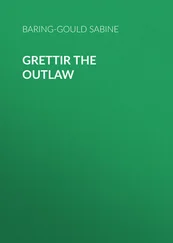Sabine Baring-Gould - The Broom-Squire
Здесь есть возможность читать онлайн «Sabine Baring-Gould - The Broom-Squire» — ознакомительный отрывок электронной книги совершенно бесплатно, а после прочтения отрывка купить полную версию. В некоторых случаях можно слушать аудио, скачать через торрент в формате fb2 и присутствует краткое содержание. ISBN: , Жанр: foreign_antique, foreign_prose, на английском языке. Описание произведения, (предисловие) а так же отзывы посетителей доступны на портале библиотеки ЛибКат.
- Название:The Broom-Squire
- Автор:
- Жанр:
- Год:неизвестен
- ISBN:http://www.gutenberg.org/ebooks/30354
- Рейтинг книги:3 / 5. Голосов: 1
-
Избранное:Добавить в избранное
- Отзывы:
-
Ваша оценка:
- 60
- 1
- 2
- 3
- 4
- 5
The Broom-Squire: краткое содержание, описание и аннотация
Предлагаем к чтению аннотацию, описание, краткое содержание или предисловие (зависит от того, что написал сам автор книги «The Broom-Squire»). Если вы не нашли необходимую информацию о книге — напишите в комментариях, мы постараемся отыскать её.
The Broom-Squire — читать онлайн ознакомительный отрывок
Ниже представлен текст книги, разбитый по страницам. Система сохранения места последней прочитанной страницы, позволяет с удобством читать онлайн бесплатно книгу «The Broom-Squire», без необходимости каждый раз заново искать на чём Вы остановились. Поставьте закладку, и сможете в любой момент перейти на страницу, на которой закончили чтение.
Интервал:
Закладка:
In former days the parishioners were never very sure whether there was to be a service in Church at Thursley or not. The sexton was on the look-out, and if he saw the parson's wig glimmering over the hedge top, as he rode along, then he at once rushed to the bell-rope and announced to such of the parishioners as were within hearing, that there was to be divine service. If there were no service, then those who had come from a distance in expectation of devotion, retired to the tavern and drank and gossiped, and were not disposed to cavil. The Church of Thursley is curious, it has a central bell-tower supported on huge beams of oak, such oaks they must have been as are never seen now. Those desiring to see the parson had to seek him in the Vicarage of the mother parish.
Mrs. Verstage accordingly had to go with her boy to Witley.
"If the boy gave a name," said the parson.
"He did, your Reverence, and such a name."
"What is it?"
"Mehetabel."
"Wherever did you pick up that name?" asked the Vicar, turning to the boy.
"Please, sir, we was doin' the Dooks of Edom in Sunday-school. We'd already learned David's mighty men, and could run 'em off like one o'clock, and – I don't know how it was, sir, but the name slipped out o' my mouth wi'out a thought. You see, sir, we had so many verses to say for next Sunday, and I had some of the Dooks of Edom to repeat."
"Oh! So you gave it the name of one of the Dukes."
"Please, sir, no. Mehetabel was the wife of one, she was married to his Grace, Dook Hadar."
"Oh, Hadar! to be sure, quite so; quite so! Very good boy, glad you are so well primed in all things necessary to salvation."
"And is the child to be called Mehetabel?" asked the woman.
"That depends," said the Vicar. "How did the boy perform the sacred function?"
"Please, sir," said Iver, "I did it as your Honor does, after the second lesson on Sunday afternoon, and the churching."
"He hadn't no surplice on," argued the mother.
"You had a bowl of pure water?" asked the parson.
"Yes, sir, rain water. I caught it out of the spout."
"And the words used?"
"The same as you say, sir; exactly."
The parson rubbed his chin.
"Was it done in thoughtlessness – in irreverent folly?"
"Oh, no, sir! I did it in sober earnest. I thought the child was going to die."
"Of course," said the Vicar, "lay baptism is valid, even if administered by a Dissenter; but – it is very unusual, very much so."
"I didn't do all that about the cross," observed Iver, "because the cat jumped and upset the bowl."
"Of course, of course. That belongs to the reception into the church, and you couldn't do that as it was – "
"In Bideabout's basin," said Iver.
"You are certain the water touched the child?"
"Soused her," responded the hostess. "She caught a tremendous cold out o' it, and has been runnin' at the nose ever since."
"I think the very best thing we can do," said the Vicar, "is that I should baptize the child conditionally, in church, – conditionally mind."
"And call her by another name?" asked the woman.
"I do not think I can do that."
"It's a terrible mouthful," observed Mrs. Verstage.
"I daresay that in practice you will be able to condense it. As for that boy of yours, ma'am, I should like a word with him, by himself."
"So, the creetur must bide Mehetabel?"
"Mehetabel it must be."
CHAPTER VII
FALSE PERSPECTIVE
As this story concerns that child which received the name of Mehetabel, it has been necessary to begin de novo with her as a babe, and to relate how she came by her name – that is her Christian name – and how it was that she had no surname at all. Also, how it was that she came to be an inmate of the Ship, and how that her fortunes were linked at the very outset of her career, on the one hand with Iver, who baptized her, and on the other hand with the Broom-Squire, whose roof – that at least of his shed – had sheltered her when every door of the squatter settlement in the Punch-Bowl, was resolutely closed against her.
But although this story begins with Mehetabel before she could speak, before she could assimilate anything more substantial than milk, yet the author has no intention of inflicting on the reader the record of her early days, of her acquisition of the power of speech, and capacity for consuming solid food. Neither is it his purpose to develop at large the growth of her mental powers, and to describe the evolution of her features. Suffice it then to say that Mehetabel grew up in the Ship Inn, almost as a child of the hostess and of her husband, with Iver as her playmate, and somewhat consequential patron.
By the parish at large, whether that of Witley or of its subdivision Thursley, she was coldly regarded. She was but a charity girl, and kind as Mrs. Verstage was, the hostess never forgot that.
Iver was fourteen years older than Mehetabel, and, above all, was a boy, whereas Mehetabel was a waif, and only a girl.
Iver, moreover, regarded the child with gracious condescension. Had he not baptized her? Did she not owe her name to him? Had he not manufactured her first feeding-bottle?
As Mehetabel grew up, it is not surprising that she should regard Iver with admiration and affection, that she cherished every kindness he showed her, and in every way sought to deserve his notice.
The child had an affectionate, a clinging nature, and she threw the tendrils of her heart around the handsome boy, who was both patron and playmate.
It is a matter wholly immaterial whether Mehetabel underwent the ordeal of the customary childish maladies, measles, chicken-pox, whooping-cough for certainty, and scarlet fever and smallpox as possibilities, for none of them cut short the thread of her life, nor spoiled her good looks; either of which eventualities would have prevented this story proceeding beyond the sixth chapter. In the one case, there would have been no one about whom to write, in the other, had she been marked by smallpox or deafened by scarlatina, the interest of the reader could not have been claimed for her – so exacting is the reader of fiction. A heroine must be good-looking, or she will not be read about.
Indeed, it is more than probable, that had the author announced his story to be one of a very plain woman, he might have looked in vain for a publisher to undertake the issue of the story.
Before proceeding further it will be well to assure the reader that, from an early age, promise of beauty was given, and not of beauty only, but of intelligence and robust health.
Mehetabel was sent by Mrs. Verstage not only to a day school, kept by a widow, in Thursley, but also on the Lord's Day to the Vicar's Sunday-school at Witley. The Vicar was an excellent man, kindly disposed, earnest in his desire to do good, so long as the good was to be done in a novel fashion, absolutely untried. Sunday-schools were but a recent introduction, and he seized on the expedient with avidity. Hitherto the children had been catechised in Church after the second lesson in the afternoon, before their parents and the entire congregation. But as this was an usage of the past the Vicar rejected it in favor of the new system. According to the traditional custom the children had been instructed in the Creed, the Lord's Prayer, and the Ten Commandments. But this did not please the innovating Vicar, who cast these out of his curriculum to make way for a knowledge of the geography of Palestine, and an accurate acquaintance with the genealogies that are to be found scattered here and there in the pages of Holy Writ, The teaching of doctrine, according to the Vicar, lay at the bottom of the divisions of Christendom, but there could be no controversy over the latitude and longitude of the sites mentioned in Scripture.
Читать дальшеИнтервал:
Закладка:
Похожие книги на «The Broom-Squire»
Представляем Вашему вниманию похожие книги на «The Broom-Squire» списком для выбора. Мы отобрали схожую по названию и смыслу литературу в надежде предоставить читателям больше вариантов отыскать новые, интересные, ещё непрочитанные произведения.
Обсуждение, отзывы о книге «The Broom-Squire» и просто собственные мнения читателей. Оставьте ваши комментарии, напишите, что Вы думаете о произведении, его смысле или главных героях. Укажите что конкретно понравилось, а что нет, и почему Вы так считаете.












